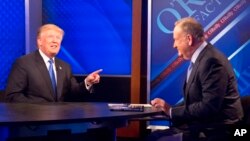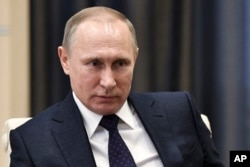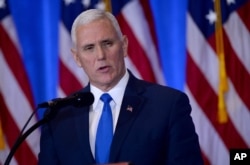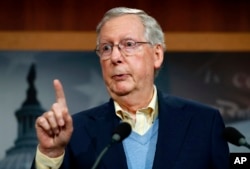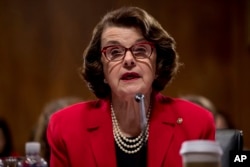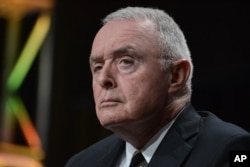Human rights groups, a number of U.S. lawmakers and several retired generals and former ambassadors say they are concerned about President Donald Trump's defense of Russian President Vladimir Putin.
In an interview aired Sunday on Fox before the Super Bowl, Trump restated his respect for Putin. When host Bill O'Reilly challenged Trump, calling the Russian president a “killer,” Trump replied: “We've got a lot of killers. What do you think? Our country's so innocent?”
The Kremlin demanded Fox apologize for what it called "unacceptable and offensive" remarks. O'Reilly dismissed the complaint on his show Monday night, saying Russia can "check in with me around 2023."
On Tuesday, Trump, on Twitter, maintained that he doesn't know Putin or have any deals in Russia.
Trump declined to say anything negative about Putin during his election campaign, repeatedly responding to questions about the Russian president by saying that it would be an asset, and not a liability, if he could have a good relationship with Putin, as well as with other world leaders.
'It's a bizarre statement'
The co-director of the U.S. program at Human Rights Watch, Maria McFarland, told VOA Monday she is worried by Trump's comments on Russia.
“It's a bizarre statement on many fronts.” said McFarland. “But the bottom line is that Trump is and has been consistently downplaying the terrible human rights record of the Russian government. We're seeing in recent years a real crackdown on freedom of expression and on critics and on civil society groups in Russia. And at the same time, we've seen a Russia that has been engaged in war crimes in Syria."
McFarland added: "These are terrible atrocities. The U.S. should be speaking out against them, and President Trump should not be joking about them or minimizing them. At the same time, it's troubling that Trump has at times professed admiration for Putin, and himself is engaging in browbeating of the media and has been making some very aggressive statements even about the courts in the U.S., which raised questions about his own commitment to democratic processes and accountability."
Pence defends Trump
Appearing on a different Sunday talk show, CBS News' "Face the Nation," Vice President Mike Pence rejected the idea that Trump was likening the U.S. to Russia.
“I simply don't accept the idea that there was a moral equivalency in the president's comments.”
Asked on a third Sunday show, CNN's "State of the Union," about Trump's comments, Republican Senate Majority Leader Mitch McConnell said he did not want to critique President Trump's “every utterance.” But he noted that Putin is a former KGB (Russian intelligence service) agent, and he called him a “thug.”
McConnell said: “We don't operate in any way the way the Russians do.”
Other Republican and Democratic lawmakers sharply criticized Trump for failing to repudiate Putin and instead suggesting the United States has "killers," too.
'Outrageous statement'
Republican Senator Susan Collins told VOA: “There just is no moral equivalency. And to suggest that there is, is a disservice to the history of our country and how we operate.”
Democratic Senator Bob Casey had this to say to VOA. “It was an outrageous statement by the president. I was very critical and I will continue to be critical." He added: “I hope the president rethinks it.”
Democratic Senator Dianne Feinstein agreed, telling VOA: “The United States of America is a very different country than Russia. We are not a country of autocrats. We are not a country of a despot. We are a free-ranging democracy very different from Russia.”
McCaffrey doesn't approve
Retired general Barry McCaffrey reacted to Trump's comments on MSNBC.
“One could argue that is the most anti-American statement ever made by a president of the United States. To confuse American values with Putin, who is running a criminal oligarchy,” he said.
A number of U.S. experts on Russia noted that under Putin's rule, a number of opposition leaders and critical journalists have been assassinated, including opposition leader Boris Nemtsov. Russian opposition leader Vladimir Kara-Murza has been hospitalized since last week, and he tested positive for poisoning on Monday. He survived another poisoning attack two years ago.
McFaul worried
Michael McFaul was the U.S. ambassador to Russia from 2012 to 2014. He wrote in the Washington Post that he does not know why Trump continues to defend Putin, saying one interpretation is that he simply wants to cultivate better relations with Moscow.
McFaul said a more worrisome interpretation would be if Trump actually admired Putin's policies and ideas on dealing with dissent and the press. During the election campaign, Trump expressed admiration for Putin, saying at least he is a strong leader, not like then-President Barack Obama.
McFaul said U.S. democratic institutions are much more robust than similar institutions in Russia, but he called on Americans not to be indifferent, and to stand up to any small steps toward autocracy.
Senate Correspondent Mike Bowman contributed to this report




